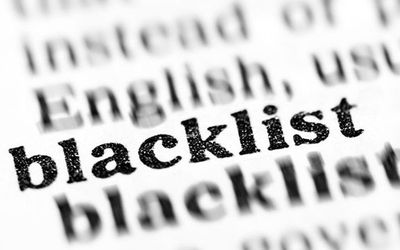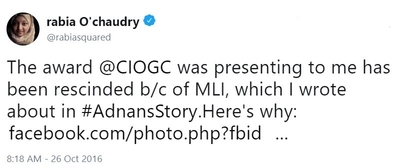Blind
Hate Drives a Wedge Among "Islamophobia" Hunters
IPT News
June 8, 2018
|
|
|
|
Share:  
|
  Be the
first of your friends to like this. Be the
first of your friends to like this.
 Wajahat Ali thinks
we're a bunch of hate mongers. Islamophobes. Part of a handful of groups "primarily responsible for
orchestrating the majority of anti-Islam messages polluting our national
discourse," he wrote in a 2011 report for the Center for American
Progress called "Fear, Inc., the Roots of the Islamophobia Network in
America." Wajahat Ali thinks
we're a bunch of hate mongers. Islamophobes. Part of a handful of groups "primarily responsible for
orchestrating the majority of anti-Islam messages polluting our national
discourse," he wrote in a 2011 report for the Center for American
Progress called "Fear, Inc., the Roots of the Islamophobia Network in
America."
But Ali also is part of a dialogue with liberal Zionists as part of the
Shalom Hartman Institute's Muslim Leadership Initiative (MLI). The program
includes travel to Israel to meet with Israelis and Palestinians
to learn about their perspectives.
For this, he is deemed insufficiently hateful about Israel. He is pilloried on social media for "faithwashing," and as "selfish parasite"
willing to "throw the Palestine cause for freedom
under the bus" and placed among "Muslim sell-outs who tickle
Islamophobes pink but whom no other Muslims listen to." And now, he's
been disinvited from speaking at this summer's annual
Islamic Society of North America (ISNA) convention – touted as the largest
gathering of Muslims in the country.
Ali published ISNA's letter on his Facebook page last week
telling him he no longer was welcome: "Other than our creed as Muslims,
there is perhaps nothing more exemplary and unifying than our community's
support for the Palestinian people of all faith traditions, in their
struggle against occupation and dispossession," ISNA Vice President
Altaf Husain wrote. Ali has failed to meet that standard, and letting him
speak "would cause us to conflict with our principles and potentially
harm the purposes for which our organization exists."
Invoking the spirit of a great
legal mind and 21st century philosopher, Ali responded with some tough questions, which amount to,
"Says who?"
How can ISNA's position - whatever it is - represent the
diverse viewpoints of 1.7 billion Muslims who disagree on 1 state and 2
state positions and the existence of the state of Israel?
Second, why is the issue of Palestine next to
"creed"? Does that mean Palestine is a religious issue? Sounds
like it. How do activists, academics and Muslims who say it is a political
issue, and critiqued my piece because I discussed the religious component
of the issue, respond to this?
Also, why is this issue more important than say the genocide
of Rohingya? The conflict in Kashmir? The plight of the Uyghurs in China?
The massacre in Syria? Do these issues not rise to such an importance that
it comes after "creed"?
Who decided and when? What happens if people disagree? Are they
going against the "creed" and is that in someway unIslamic?
These are all fair questions, are they not?
We've noted the blind hate that drives several key Islamist leaders in
the United States when it comes to the Israeli-Palestinian conflict. It's
the kind of thinking that lets otherwise intelligent people argue that Zionists are inherently creepy and cannot be
feminists, to argue that the Israeli military and ISIS are moral
equivalents. Repeatedly.
Ali – again, the guy who was the lead author on "Fear, Inc."
and who hates us like poison – that guy is insufficiently hateful
when it comes to Israel and is facing an emerging blacklist among American
Islamists.
He's not alone.
Fellow MLI participant and attorney Rabia Chaudry has also been smeared
as a "Zionist shill." Chicago's Council of Islamic
Organizations rescinded an award it intended to present her in
October 2016 because of her work with MLI even though "your
support of the Palestinian cause is quite evident from your blog and
tweets. Even those who oppose the award to you have acknowledged it to a
large extent.

Unbowed, she explained last month that she opposes "cultural or
educational boycotts because they make societies and people more entrenched
in ideological extremism. The boycott campaign targeting Israel, known as
BDS, "is not a pillar of my religion or a moral imperative."
That's wrong, Georgetown University Professor Jonathan Brown argued last week after Wajahat Ali went
public about the ISNA invitation. BDS "IS WHAT THE PALESTINIAN CIVIL
SOCIETY HAS ASKED ITS ALLIES WORLDWIDE TO SUPPORT," he wrote in a snark-laden Facebook posting responding to Ali.
It's not talking to Zionists that's the problem, he said, it's the
travel to Israel, which violates the boycott against the Jewish state.
He cites several people who "saw what was going on and called
MLI," including Laila Al-Arian. What Brown doesn't say, but those who
follow him likely know, is that Laila Al-Arian is Brown's wife. And her
father Sami served on the Palestinian Islamic Jihad's governing
board and remains a rabid Israel hater and someone comfortable around anti-Semitic conspiracy nuts.
Muslims engaged in dialogue with Zionists is a pretty likely trigger in
that family.
Brown also called out Ali for an article about the ISNA incident published in The Atlantic. It "basically
defaulted to being a major public accusation that ISNA, the largest Muslim
organization in America, is anti-Semitic," Brown wrote. And that can't
be true because "ISNA leaders have met with more rabbis, Jewish
community leaders and Jewish Voices for Peace reps than you could
count."
While it has "Jewish" in its name, Jewish Voice for Peace is a
rabidly anti-Israel group which helps push the BDS boycott and staunchly defended Palestinian terrorist Rasmieh Odeh – who led a 1969 Jerusalem bombing
operation which killed two college students.
Jewish Voice for Peace is hostile to Israel, so Brown is comfortable
touting the group and its dialogue with ISNA. Wajahat Ali is insufficiently
hostile to Israel, therefore, he should be blacklisted. ISNA, which
presents itself as a mainstream Muslim organization despite roots
in the Muslim Brotherhood and a tendency to feature some radical
speakers and crank
publications at his conventions, has folded in the face of internal
pressure before.
Despite initially agreeing to let them in, ISNA tossed
out Muslims for Progressive Values (MPV), which supports
"equality and inclusion of all individuals, regardless of sexual
orientation or gender identity, in society and in the Muslim
community," from last year's convention bazaar.
We have strong, fundamental disagreements with Wajahat Ali. That won't
change, nor will his views about those he believes peddle
"Islamophobia."
But if ISNA believes, as Altaf Husain wrote, that letting Ali speak
could "potentially harm the purposes for which our organization
exists" because of his dialogue with Zionists, maybe it's time for
people inside and outside ISNA to ask exactly what are those purposes?
Related Topics: Free
Speech, Islamist
Censorship, The
Islamic Society of North America (ISNA), ISNA
convention, Wajahat
Ali, Muslim
Leadership Initiative, blind
hate, Altaf
Husain, Rabia
Chaudry, Jonathan
Brown, Laila
Al-Arian, Sami
Al-Arian, BDS,
Jewish
Voice for Peace, Muslims
for Progressive Values
|































No comments:
Post a Comment